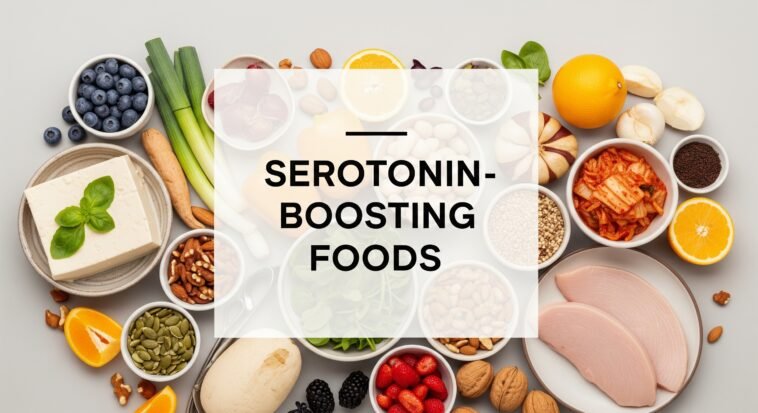
Ever wonder why eating your fave comfort food feels like a warm hug?
That mood boost isn’t just in your head—it’s thanks to serotonin, aka your brain’s “happy juice.”
Fun fact: about 90% of it is made in your gut, not your brain.
Yep, your stomach’s basically running the show like it’s the main character.
This guide dives into 15 science-backed foods that help boost serotonin the natural way—no sketchy pills, just real food with real mood power.
Think of it as your Avengers lineup for better vibes, deeper sleep, and staying sane in a world that still lets pineapple on pizza happen.
You’ll also get easy hacks to sneak these foods into your daily eats without turning into a kale smoothie influencer (unless you’re into that).
The Top 15 Serotonin-Boosting Foods
1. Salmon and fatty fish
Salmon isn’t just for your fancy brunch IG story.
It’s loaded with omega-3s (EPA and DHA), which help your brain fire on all cylinders and make your serotonin receptors more chill and responsive.
Bonus: it’s got vitamin D and about 250mg of tryptophan per serving.
Pro tip: Channel your inner coastal grandma and eat fatty fish like salmon, tuna, or sardines 2–3 times a week.
2. Turkey
Turkey’s tryptophan levels are no joke—around 404mg per 100g of roasted turkey breast.
That’s why it knocks you out post-dinner.
Plus, it brings B vitamins to the party, which your brain needs to actually build serotonin.
- Read also: Are There Brain Foods That Actually Make You Smarter?
- Read also: 8 Foods That Balance Hormones in Females That You Should Know
3. Eggs
Eggs are serotonin’s breakfast buddy.
They’re full of tryptophan, B vitamins, and choline (great for your brain).
Yolks even pack vitamin D, and the protein keeps your blood sugar—and your mood—steady.
4. Spinach and leafy greens
Spinach isn’t just for green smoothies and Popeye cosplay.
It’s loaded with folate and magnesium, two nutrients your brain uses to make serotonin. Low folate = grumpy brain.
Science said it, not us.
Add it to omelets, wraps, or your sad desk salad to make it less sad.

5. Pumpkin seeds
These guys may be small, but they’re packing 576mg of tryptophan per 100g.
Add zinc and magnesium to that, and you’ve got a serotonin-supporting snack that actually does something for you.
Sprinkle on yogurt, blend in smoothies, or eat ‘em straight like trail mix with a purpose.
6. Oats
Oats are the quiet overachiever of the pantry.
They boost tryptophan’s chances of reaching your brain by triggering insulin (yes, that’s a good thing here).
7. Bananas
Bananas are basically the Minions of serotonin support—small, yellow, and wildly effective.
They’ve got tryptophan and a hit of B6, which your body needs to actually make serotonin.
Plus, the natural sugars help get tryptophan into the brain faster.
8. Dark chocolate
Dark chocolate (go 70% cacao or higher) is the moody bestie you didn’t know you needed.
It’s got tryptophan, phenylethylamine (a feel-good compound), and flavonoids that boost blood flow to your brain.
Science backs it: a couple squares a day can legit reduce stress. Just don’t eat the whole bar unless you’re emotionally prepared.
9. Cottage cheese
Cottage cheese isn’t just for gym bros and weird ’70s recipes.
It delivers a solid 320mg of tryptophan per cup, plus casein protein that digests slowly—aka steady amino acid delivery for hours.

10. Quinoa
Quinoa is basically the Hermione Granger of grains—smart, reliable, and kind of magical.
It’s a complete protein (yes, plant-based!) with all the amino acids, including tryptophan.
Plus, those slow carbs help ferry tryptophan to your brain without the sugar crash.
11. Tofu and soy products
Tofu is the meatless serotonin plug.
With around 280mg of tryptophan per 100g, it’s perfect for vegans who want good vibes and a solid stir-fry.
Soy products like tempeh or edamame bring the same brain-boosting energy.
12. Cherries
Tart cherries come with a serotonin-adjacent bonus: melatonin.
That’s the hormone that tucks you in at night.
They also pack antioxidants, and studies say they legit help you sleep longer and deeper.
Think of them as the Taylor Swift of fruit—sweet, dramatic, and always good at helping you process feelings.
13. Yogurt and fermented foods
Serotonin’s HQ? Your gut. And probiotic foods like yogurt, kefir, and even sauerkraut are like the IT department—keeping your microbiome online and serotonin flowing.
14. Nuts and seeds
Almonds, walnuts, sunflower seeds—they’re the snack version of a wellness retreat.
Packed with tryptophan, healthy fats, and vitamin E, they support your brain like a well-funded therapy session.
15. Sweet potatoes
Sweet potatoes are complex carbs with benefits—like the rom-com lead who’s emotionally available and roasts well.
They help usher tryptophan to your brain, support stable energy, and bring B vitamins, fiber, and vitamin A to the table.
Practical Tips for Maximizing Serotonin-Boosting Benefits
Timing matters
Think of serotonin like a diva—it shows up best when the lighting (and timing) is right. Here’s how to feed your mood throughout the day:
Morning
Start with eggs, Greek yogurt, or tofu—stuff that brings amino acids to the breakfast table.
Your brain’s basically setting up serotonin production for the day like it’s clocking into work.
Afternoon
This is when you call in the complex carbs—think quinoa, oats, or sweet potatoes—with tryptophan-rich foods.
The carbs help sneak tryptophan into your brain like it’s wearing an invisibility cloak.
Evening
Keep dinner light and gut-friendly (soups, steamed veggies, baked salmon).
Heavy meals = serotonin-sabotaging sleep.

Combining foods for synergy
Let’s be real—some foods are better together. These combos work like serotonin supergroups (basically the Avengers of your plate):
- Oats + Banana + Nuts = Carbs + tryptophan + B6. Tastes like comfort, works like science.
- Salmon + Quinoa + Spinach = Omega-3s + complete protein + folate. Fancy but functional.
- Greek Yogurt + Berries + Pumpkin Seeds = Probiotics + antioxidants + serotonin fuel. It’s like a parfait with a PhD.
Lifestyle factors that support serotonin
Because even serotonin needs a supporting cast:
Move your body
Even a 20-minute walk boosts serotonin.
Think of it as shaking the snow globe in your brain.
Get some sun
Sun = vitamin D = more serotonin.
Morning sun hits different—for your mood and your circadian rhythm.
Sleep like you mean it
Your brain resets while you snooze.
No sleep = serotonin burnout.
Aim for 7–9 hours and maybe cut the doomscrolling by 9 p.m.
Stress less
Chronic stress is a serotonin thief.
Try breathwork, journaling, meditation, or even rage-cleaning—whatever helps you vibe lower.
The Long-Term Benefits of Serotonin-Supporting Nutrition
Making serotonin-friendly foods a regular part of your life isn’t just about feeling good for a day—it’s about setting your brain, body, and mood up for the long game.
Here’s what you unlock when you stick with it:
Better sleep quality
Serotonin helps make melatonin, which helps you actually fall asleep and stay asleep.
No more 3 a.m. existential crises over whether you sent that email with a typo.
Reduced anxiety
Balanced serotonin = calmer nervous system = less anxiety spiraling over minor inconveniences (looking at you, slow Wi-Fi). It’s basically internal chill mode.
Improved digestion
Most of your serotonin is made in your gut, so feeding it the good stuff (probiotics, fiber, fermented foods) keeps everything flowing—literally and emotionally.
Enhanced cognitive function
When your neurotransmitters are doing their job, your brain runs smoother.
More serotonin = better focus, sharper memory, and fewer “wait what was I doing again?” moments.
Stronger immune system
Lots of serotonin-supporting foods are also immune boosters (hi, spinach, yogurt, nuts).
You’ll feel emotionally balanced and dodge that office cold like a champ.

- Read also: How Does Junk Food effect And Damage Your Brain?
- Read also: Nutritional Foods For Kids That Can Boost Their Brain Health
Conclusion: Your Path to Natural Mood Enhancement
You don’t need a full-on food makeover or some sad diet plan to boost serotonin.
Just start sneaking in those 15 mood-friendly foods we talked about—think of them as your mental health pantry essentials.
The trick? Be consistent and give it time.
This isn’t a Netflix binge kind of fix—it’s more like a slow-burn rom-com where you fall in love with how good you feel week after week.



